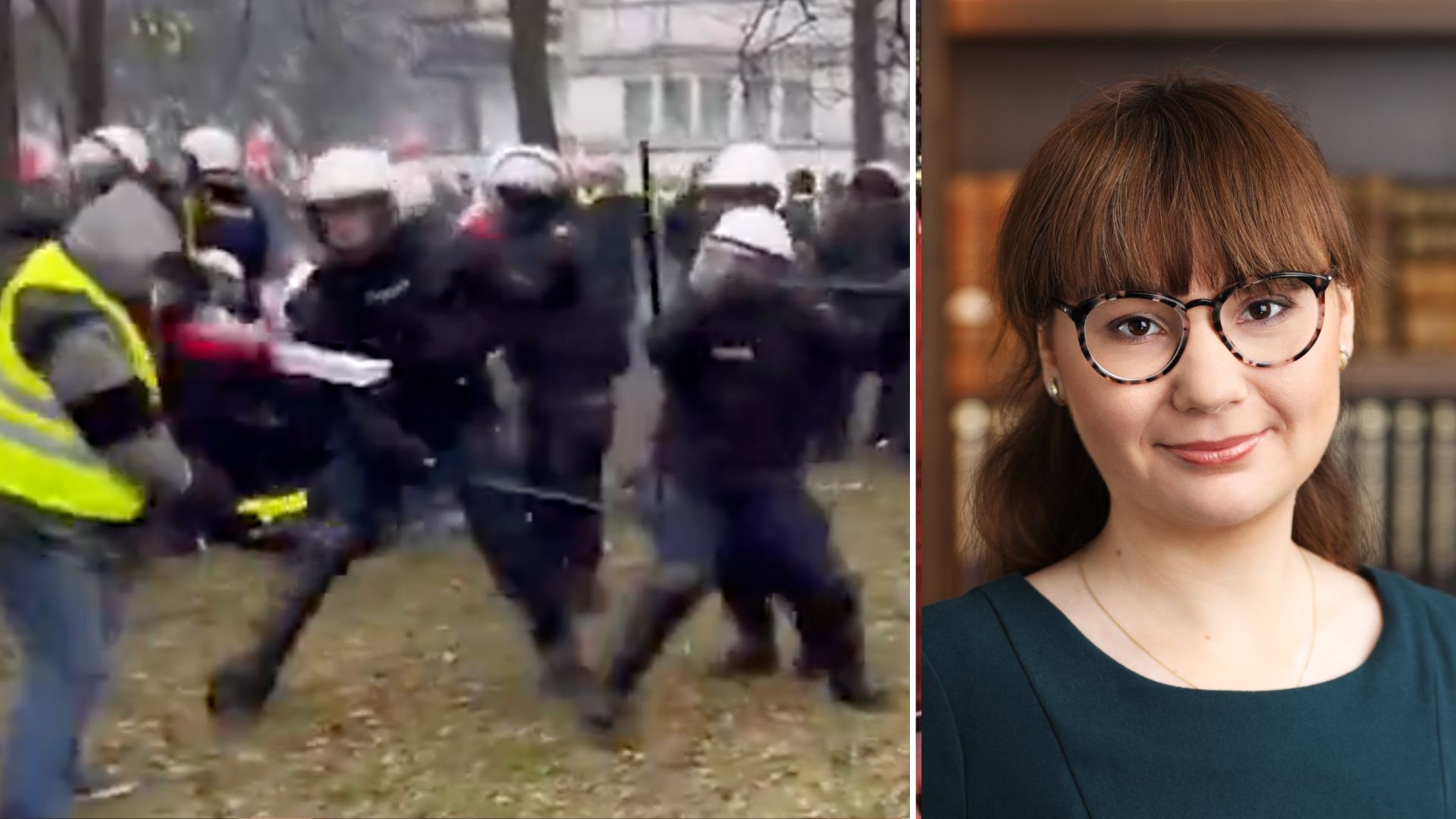Were there really some 50 farmers arrested during last week’s protest in Warsaw, as the government claims? How many of those arrested farmers is the Ordo Iuris Institute defending?
We are currently representing two farmers who were detained on the day of the protest. But we are constantly receiving information about more people who need our legal assistance in connection with the March 6 farmers’ protest in Warsaw.
We are in contact with them and will also get power of attorney or authorization to defend them if necessary.
As for the number of detainees given by the police, I find it difficult to comment on that. We have information from the Rural Solidarity trade union. Fewer people than that have turned to them. Neither family nor close friends of these dozens of alleged detainees reported to Rural Solidarity.
On the day of these detentions, a total of six people reported to Rural Solidarity, and we do not know who the others are at this moment [on Monday, March 11]. Were they Solidarity activists? Were they farmers? We have no such information.
And those farmers that Ordo Iuris defends, what kind of people are they and what exactly were they arrested for?
One of them is a 65-year-old farmer from Lower Silesia who was detained by police on the day of the protest. We were approached by Rural Solidarity to give him legal assistance. They informed us that this farmer’s family is very concerned about his health because the man has serious cardiac problems.
On the day of his arrest, later in the evening, I went to the police station where he was supposed to be held. There, I was informed that he had been taken to an urgent medical examination and that any proceedings involving him would not take place until the next day.
On the morning of the next day, we contacted the police at the Zytnia Street Police Station, where this detained farmer was supposed to be staying. They told us that the man had returned from the medical examination and that they would inform us when there would be proceedings involving him.
Such proceedings did not take place until Thursday afternoon, that is, one day after his arrest. He was charged with participating in a mob and violating the bodily integrity of two police officers.
This violation of police officers’ bodily integrity allegedly consisted of throwing eggs in their direction and hitting them with those eggs in the legs. In addition, this act was classified as hooliganism.
What penalty does this incur? Could he go to prison?
Yes, both participation in a mob and violation of bodily integrity of police officers are punishable by up to three years in prison. The punishment can be even more severe when those deeds are qualified as hooliganism, as in this case.
Why was it classified as hooliganism?
Because this man allegedly acted in public and without reason, showing blatant disregard for the law.
But he was at a protest, right?
Well, yes, and this legal qualification of hooliganism is tantamount to saying that this man’s participation in the protest on March 6 was without cause. This is, of course, at odds with the fact that farmers came to Warsaw to defend their interests and the interests of Poles in the face of unfavorable European Union climate policy regulations.
So it cannot be said that the participation of the farmer we represent in the protest was without reason. He had a very good reason: He wanted to present his views, to manifest them at a legal gathering.
It was a legal protest, right?
Yes, except that at some point, it was disbanded by the organizers. Still, this farmer had come to a protest that was legitimate and legal and that had been previously announced.
On the one hand, he is only accused of having thrown eggs at police officers’ legs, and on the other hand, he is being treated like a serious criminal. Before his release, he was fingerprinted.
Fingerprints are taken on a special device. You have to put your fingers on a special fingerprint reader. In this farmer’s case, the technicians who handled the fingerprinting process reported that the device could not read his fingerprints because his hands were so worn. The hands of this alleged serious criminal, that is, this 65-year-old farmer, are so worn by decades of hard work that his fingerprints cannot be seen by a fingerprint device.
So he was a real farmer and not some hooligan. The Polish authorities said that only hooligans, and not real farmers, had been arrested at the March 6 protest in Warsaw.
Exactly, yes. This guy is a real farmer, who explained to the police that all his life his hands had been his work tools.
There was this narrative from the authorities that those arrested were serious hooligans who were caught throwing cobblestones, and that most were drunk. So it is worth noting that this 65-year-old farmer was sober at the time of his arrest.
What about the other detained farmer, in whose defense Ordo Iuris has intervened?
I am not the one who intervened personally in this case, but this other farmer has an even stranger charge. It is also participation in a mob, which, as I pointed out earlier, is punishable by imprisonment of up to 3 years, but the description of his crime is as follows: moving with the crowd. That is, this 22-year-old farmer from the Greater Poland region was walking along with other protesters, and for this, he was detained and charged.
In addition, as in the case of the older man, this too has been classified as hooliganism, which means that the severity of the punishment should be correspondingly higher. Hooliganism consists of walking in a crowd!
We have seen many videos of the use of force by the police against protesters, who appeared to be behaving quite passively. Under Polish law, can the police use force in such a way without warning, even if there is no active resistance from protesters or from those people who refuse to disperse after a protest is disbanded?
Absolutely not. In the opinion of the Ordo Iuris Institute’s lawyers, this use of direct coercive measures by the police was unjustified in many cases. In such a situation, according to the provisions of our Law on Direct Coercive Measures and Firearms, the police should first call on a person to behave lawfully and warn him or her of their intention to use these means of direct coercion.
In the videos, we see neither these calls nor any warning that the police intend to enforce such direct coercive measures. There was even a situation where an MP, Slawomir Mentzen from Konfederencja, who was standing together with other protesting farmers and talking to them, was at one point sprayed with tear gas.
I would add that the recordings also show other instances of improper behavior by police officers.
In one of the videos, for example, you can see a policeman throwing a cobblestone at a crowd of protesters. In another, one of the participants in the gathering can be seen being led by two police officers. His hands are cuffed behind his back, and at one point, one of the policemen hits him on the head for no apparent reason. In one case, you can see policemen picking out one young man with a Polish flag in his hand from a small cluster of protesters and brutally knocking him to the ground.
This type of use of force is not authorized. This is why the lawyers of the Ordo Iuris Institute are now analyzing all the evidence available in the media or sent to us by different people. We will be signaling to the prosecutor’s office those police officers who have exceeded their authority.
In terms of support for the detained farmers, I understand that you offer free legal assistance, right?
Yes, our legal assistance to injured or detained farmers is fully free of charge. Of course, if there are other victims of police action, they, too, can turn to the Ordo Iuris Institute for legal assistance.
There are already more people who are turning to us for advice in connection to the March 6 protest. We analyze each such case and react if necessary.
Were you at this farmers’ protest?
Yes, I was there.
How do you assess the behavior of the protesters? I’m not talking about those detained, but in general, was it a protest where there was violence, where there were maybe some groups of people not necessarily related to farming, who wanted to take advantage of the situation to attack the police, for example?
I was at the protest before noon that day, on March 6. Of course, I could not be everywhere and I did not see everything. But what I saw was a peaceful, legal gathering, attended not only by men in their prime, but also by many elderly people, women, and children, even some of kindergarten age.
That’s why later in the afternoon, when I saw footage appearing on social media of the brutal pacification of this protest, it was really shocking to me precisely because I knew that old people as well as women and children were also there. That is why this narrative that was later given about this demonstration, saying it was not a protest of farmers, but just ordinary hooligans, is in my opinion completely untrue.
I saw with my own eyes many peaceful participants in this protest.
In your past experience as a lawyer, have you had to deal with such situations, where at this type of peaceful protest, participants were arrested and charged with these types of crimes? Or is this something new in Poland?
What happened at the March 6 farmers’ protest in Warsaw is like a return to what happened earlier before eight years ago (during Donald Tusk’s previous government), for example at the Independence March that takes place every year in Warsaw. At that time, too, there were a lot of media reports about the provocations that were taking place during the Independence March and, as a result, people who remained completely passive and did not behave aggressively were detained or pacified.
This is sort of a return to what happened under the previous Civic Platform (PO) government when Donald Tusk was also prime minister.
Can protesters, be they farmers or other social groups who would like to protest, or any other kind of people who participate in this type of protest, somehow protect themselves from arrest and these types of charges? Or do they simply have no other choice in today’s Poland, if they want to manifest their views, but to risk this happening to them too?
With what happened on March 6, it is hard to resist the impression that those who were arrested and now face charges are simply random people who found themselves in the wrong place at the wrong time.
So the question is whether it is possible to somehow protect oneself against such situations. If I hear from the stories of the participants that just random people from a group, from a gathering, are caught, it is difficult to guarantee that a particular participant of such a gathering will not be treated in the same way as the people we represent and who were detained.
What you need to do is simply know your rights and also not let yourself be persuaded into confessing to something you didn’t do in order to be released early from custody.
If someone has been detained, first of all, he or she should demand that a relative or a friend be contacted and informed about the situation, and it is important not to give explanations to the police without the presence of one’s legal counsel.
The Solidarity trade union provides such legal assistance in cooperation with the Ordo Iuris Institute.
Finally, it should also be noted that it is hard to resist the impression that this whole course of events that led to these arrests had one basic goal: to intimidate those people so that they would not protest again.
You can’t give in to this kind of pressure either. You have to be brave enough to know your rights and exercise one of your basic, fundamental, constitutional rights, which is the right to assembly.
I understand that you are under the impression that this behavior of the police resulted from some top-down orders. So, according to you, it wasn’t the case that the police officers just behaved incompetently at this particular protest?
It’s hard not to get that impression. After all, how many times before, over the past few years, even when some protesters behaved in a very vulgar or aggressive way towards the police, police officers would not react?
For example, I am thinking of the well-known left-wing activist who is called “Grandma Kasia” in the media, that is, Catherine A.
She’s an LGBT activist, right?
Yes, she’s an LGBT activist. And there are videos of her hitting police officers, with these officers remaining passive the whole time. Here, in contrast, the police were seen escalating things.
When the police remained passive in the face of Grandma Kasia’s behavior, that was under the Law and Justice government, yes?
Exactly, yes.
Magdalena Majkowska is a lawyer working with the Process Intervention Center of the Ordo Iuris Institute and an internship coordinator on behalf of the institute. She graduated with honors from the Faculty of Law and Administration at the University of Warsaw in 2017.
She has authored a number of publications related to freedom of speech and has focused her legal work on protecting this freedom, along with the freedom of conscience and freedom of assembly, as well as protecting the family from state intervention.






